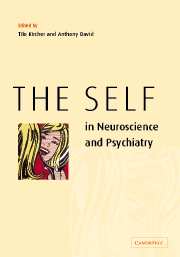Introduction: the self and neuroscience
Published online by Cambridge University Press: 18 December 2009
Summary
Who are we and what makes us who we are? Like our world, our self is a construction of our minds. But we do not live in isolation. The self is also a construction of our relations with other selves. And most intriguingly, the self is a construction of its relation with itself. One question is, how does the mind construct this world and ourselves in it? Constantly we think, feel, decide, perceive. Understanding how these things happen is central to our grasp of what kind of being we are. The way our mental life is constituted is also important to our understanding of who we are individually, because the variation of our mental lives constitutes our feeling of differentiation between our fellow humans. Mental states, unlike most other things of our everyday experience, have no spatial characteristics and they do not seem to belong to a world constituted by physical things. How to place our mental experience in the physical universe is therefore perplexing. Mental phenomena also interest us because we infer from ourselves that others have similar mental experiences. Social interactions require us to understand each other's thoughts and feelings. And language would not exist as a medium of expressing our inner world without our elaborate cognitive abilities. We seem to understand the content of our mind readily from our own experience. The problem arises when we try to know objectively, independently from ourselves, what we experience.
- Type
- Chapter
- Information
- The Self in Neuroscience and Psychiatry , pp. 1 - 6Publisher: Cambridge University PressPrint publication year: 2003
References
- 1
- Cited by



